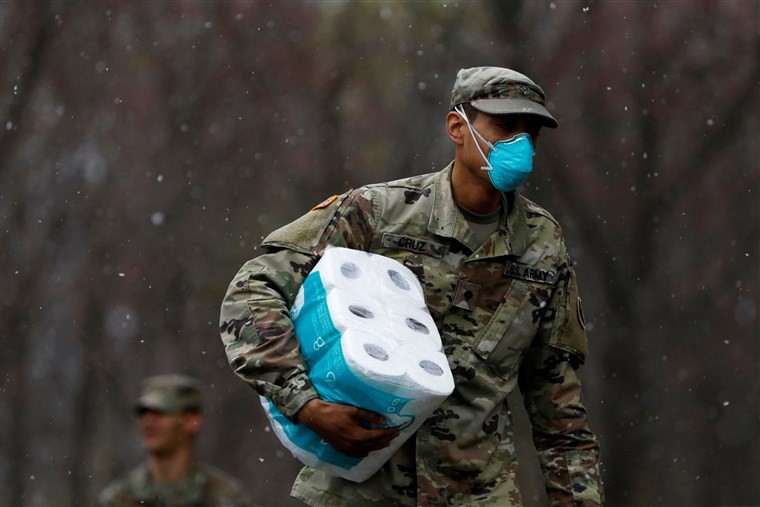THE SILVER LINING—TEN BLESSINGS OF THE CORONAVIRUS PANDEMIC
Introduction
As of this writing, COVID-19 has afflicted hundreds of thousands worldwide. Thousands have died. The economy is in shambles. Church meetings, sporting events, and virtually all other large gatherings have been suspended. Planned travel has been disrupted. I in no way intend to minimize the suffering of those who have had, are now experiencing, or will yet catch the virus, nor that of their friends or families. Nor am I unsympathetic to those whose employment, schooling, economic situation, or vacation plans have been impacted.

But there is much value in looking on the positive side and considering what lessons we can learn from our current situation. Nephi reminded us that God “doeth not anything save it be for the benefit of the world.” (2 Nephi 26:24) That is not to say that God sent the coronavirus to us. But He could surely have prevented it. Why didn’t He? The obvious answer is that He knew it would be good for us!

Of course, not everyone will find the current experience to have been a blessing. Some will let it become an excuse to become bitter, to feel victimized, and even to turn against God. It reminds us of Mormon’s summary of the effects of a long period of warfare between the Nephites and the Lamanites in the Book of Mormon. He noted:
Behold, because of the exceedingly great length of the war between the Nephites and the Lamanites many had become hardened, because of the exceedingly great length of the war; and many were softened because of their afflictions, insomuch that they did humble themselves before God, even in the depth of humility. (Alma 62:41)
There are many reasons to focus on the blessings of this season of coronavirus rather than let it harden us. Research has found that our immunity increases when we look on the bright side of things. In one study when people were deliberately exposed to a virus, those with negative emotions were 2.9 times more likely than their more positive counterparts to catch a respiratory illness. And for those who did become sick, recovery time was found to correlate with the level of their optimism.
Furthermore, staying positive even in the face of significant challenges is a divine imperative. Paul reminded the Thessalonians: “In every thing give thanks: for this is the will of God in Christ Jesus concerning you. (1 Thessalonians 5:18.)
So, what are the blessings of the coronavirus pandemic for which we should be grateful? There are probably many more than any of us individually has thought of. But they would include at least the following ten:
The Blessings of Coronavirus
1. Our hearts turn more readily to the Lord

In the 11th chapter of Helaman, Mormon recounted how the Nephite nation went from extreme wickedness to remarkable righteousness and back to wickedness again twice within just a thirteen year period. In each case, the return to righteousness was precipitated by great destruction which the Lord sent upon the people (or allowed them to experience.) Lest his readers overlook the obvious, in Helaman 12:3 Mormon summarized the cause and effect relationship as follows:
And thus we see that except the Lord doth chasten his people with many afflictions, yea, except he doth visit them with death and with terror, and with famine and with all manner of pestilence, they will not remember him.
But why is it so important to God that we remember Him? Does He really need more praise and attention? Of course not. But we need the blessings which can come to us only when we turn our hearts to Him. When we do, we will follow His commandments. We will then learn that He has given them for the sole purpose of sharing with His children the recipe for how to become the happiest they can be, both in this life and in the next.
Does God enjoy seeing His children sick and in some cases dying from a serious respiratory illness? Obviously not. But He enjoys much less seeing them dying spiritually. Physical illness is temporary. The effects of spiritual illness and spiritual death can last forever. The Lord, in His infinite wisdom and goodness, knows that it is much better for us to suffer for a short time, if necessary, if it will increase our chances of having a fulness of joy afterwards.
Even the Greek philosopher Plato recognized this truth. He observed: “There are few men so obstinate in their atheism, that a pressing danger will not reduce to an acknowledgment of the Divine Power.” Someone said it even more succinctly during the First World War: “There are no atheists in the trenches.” The World War II version was “There are no atheists in foxholes.” If the coronavirus leads anyone to call upon a God whom he has neglected, it will have made the whole experience worthwhile, at least for him.
2. We gain an eternal perspective

Will many of us see someone we know and love succumb to the coronavirus pandemic? Quite possibly. If so, we will have another opportunity to reflect on how short life is compared to eternity. God doesn’t look upon death the way we do. To us it may seem like the worst thing that could happen. To God, it’s His way of inviting us home! I like the word my wife uses for it: graduation. Someday we will know, as God does now, that death is no more a tragedy than is marching across the stage to receive our diploma. It may mean the end of our “schooling,” but it also opens the door to new and wonderful future opportunities.
3. Challenges can bring out the best in us and help us grow

Recently there were two YouTube clips that went viral in Australia about toilet paper. One was of three grown women fighting in a department store over a packet of toilet paper. The other showed two young children pulling a large cart of toilet paper behind them and stopping at the homes of elderly people in their neighborhood to give them a roll.
The coronavirus challenge gives us opportunities to love, sacrifice, and minister to others in new and creative ways. As we do, we become ever more like our Father in Heaven, who spends all His time in serving and blessing His children.
4. It helps us appreciate even more the blessing of having a living prophet
Latter-day Saints are grateful to be led by 95 year old President Russell M. Nelson, whom they revere as a modern-day prophet of God. They see his calm and inspired direction of the Church during the current crisis as a manifestation of God’s love for us. They are in awe of how timely was the Church’s move from a three-hour block of Sunday services to a two-hour block. This was coupled with emphasis on studying the Come Follow Me course materials at home, as individuals or families. Now that Sunday services have necessarily been suspended for a time, it seems almost normal and natural to have Sunday meetings as a family rather than depend on a local congregation.
Also, President Nelson’s recent reassuring video message to Church members throughout the world has provided much-needed comfort to those fearful of the future. You can see it (or see it again) by clicking below:
5. It will make the April 2020 General Conference of The Church of Jesus Christ of Latter-day Saints even more memorable

President Nelson promised months ago that the April 2020 general conference would be unprecedented and unforgettable. We knew it would commemorate the 200th anniversary of Joseph Smith’s First Vision. But even President Nelson may not have known then that it would also be unforgettable because the conference center would be empty. The famed Tabernacle Choir would not participate. And that conference sessions would be transmitted from “a small auditorium on Temple Square,” where only the First Presidency and others speaking or praying in each session would be physically present.
Nevertheless, general conference promises to be the best “attended” in the history of the Church, as members and friends view the proceedings together from the comfort of their own homes in virtually every nation on earth. There they will receive the comforting word of the Lord from His inspired servants.
It reminds us of the Lord’s instructions to the Church in 1833: “Behold, it is my will, that all they who call on my name, and worship me according to mine everlasting gospel, should gather together, and stand in holy places.” (D&C 101:22.)
Generally, when we think of “holy places,” we think of temples. But prophets have taught that second only to the temple as holy places are our own homes. Though at conference time we may be separated from Church leaders and other members by thousands of miles, in a very real sense we will be “gathered together” and “standing in holy places.”
Similarly, in D&C 45:32, the Lord instructed, “My disciples shall stand in holy places, and shall not be moved.” While much of the world will continue in turmoil and fear, Latter-day Saints and as many of their friends as care to participate will be together in two wonderful days of general conference, to a significant degree “unmoved” by all that is going on elsewhere in the world.
6. It will help us appreciate Church meetings and activities, including the temple, more than ever

Since at least Roman times, people have observed that “absence makes the heart grow fonder.” Surely our enforced absence from sacrament meeting, Relief Society, priesthood meeting, Primary, ward council meetings, presidency meetings, and a myriad of other ward and stake activities will help us recognize the value of what we too often took for granted and maybe even complained about on occasion. And unable in many cases to make in person ministering visits, we may look forward to a future resumption of them more than we would ever have imagined.
Among the Church activities we will miss will be temple attendance. Some of us may have felt in the past that going to the temple was a duty but not necessarily a privilege. We may have realized that someday we really needed to attend to our own endowment or sealing. We may have even scheduled a date on which we would do it. We may have gone to the temple on occasion to do proxy work for our own departed relatives. But we may not always have enjoyed the experience as much as we could have. We may not have realized that the Lord wanted us to attend the temple primarily for the feelings we could have while we were inside.
Now that all temples are closed indefinitely for proxy work and most are closed even for living ordinances, many of us may come to feel an unexpected sense of deprivation. I’m guessing that when the temples open again, they will be better attended than ever before.
7. It will give new meaning to the sacrament (communion)

Perhaps that which many Latter-day Saints will miss the most on Sunday for the foreseeable future will be the opportunity to partake of the emblems of the sacrament together with the rest of their ward (congregation). Of course, those who have a priesthood holder in the home may be given delegated authority from their bishop to continue to provide that ordinance for their family members. But what of those who have no such priesthood holder in their immediate family? While initially it was assumed that ministering elders could and should provide that opportunity to families to whom they minister, as the pandemic grows, both the ministering elders and those to whom they minister may feel reluctant to get together for that purpose.
It may be necessary for some of us to go for weeks or even months without thus renewing our baptismal commitments by partaking of the sacrament. That is unfortunate, but it is not tragic. The sacrament, for all its importance as a reminder of the atonement and of our covenants, is not itself a saving ordinance. We do not administer the sacrament on behalf of the deceased by proxy in the temples. On stake conference and general conference Sundays we do not even administer the sacrament to the living.
Furthermore, there is no “expiration date” implied in the previous occasions on which we have taken the sacrament. We can continue to reflect upon promises we have made to the Lord in the past and the promises He has made to us. But almost certainly, when it is possible once again to meet together and hear the words of the sacrament prayers and again take the bread and water in remembrance of the Savior, we will do so with renewed enthusiasm and appreciation.
8. We may come to appreciate our employment even more

If we are one of those who is temporarily unemployed because of the effect of the coronavirus pandemic on the world economy, we are probably already missing our former eight to ten hour workday. If we are still employed, we may be even more grateful for our job, as we see others around us who are not. We may even become motivated to improve our education and employment skills so that we’ll be more likely in the future to be among those retained during a company downsizing.
9. We have time available now for personal and family activities we thought we didn’t have time for before

How many of us have put off writing our personal history, doing family history, organizing photos, studying the scriptures, cleaning the garage, painting the fence, learning a new language, reading a good book, or putting some goals down in writing? We told ourselves we get to all of that someday when we had more time. Well, that “someday” is now!
Some of us are temporarily unemployed and have whole days we can dedicate to long-procrastinated projects. Others are working from home and at least have the additional hours we used to spend commuting. Even if we continue to work as usual, we have time on Sundays we didn’t previously have.
If we haven’t already become serious about participating in the Church’s Come Follow Me program as a family, we can no longer use the excuse that we don’t have time. And we may find that with our new-found hours we can get better acquainted with our family and become more closely knit together than ever before.
Though many public parks and beaches are properly closed for the duration of the coronavirus epidemic, there are other places available where we can go alone or with the family to enjoy nature and communicate with each other and with God. And we may learn that we don’t have to rely on commercial entertainment and organized sports to enjoy life and to have fun with those we love.
10. We may learn the importance of both temporal and spiritual preparation

The recent shortage of toilet paper, hand sanitizer, and even groceries in stores has given many a stark awareness that they were not prepared for such an emergency as the present one. The scriptures are quite clear that there will be other emergencies in the future. They tell of a day when “a desolating sickness shall cover the land,” and that there will be earthquakes and “many desolations.” (D&C 45:31-33.) Elsewhere we read of a great hailstorm which will destroy the crops of the earth. (D&C 29:16.) There will be “tempests” and “waves of the sea heaving themselves beyond their bounds.” (D&C 88:90.)
But the Lord has told us, “If ye are prepared ye shall not fear.” (D&C 38:30.) If we view the present coronavirus episode as a “dress rehearsal” for future emergencies, we are quite likely to be better prepared the next time and will look back with gratitude for lessons previously learned.
But we may also become increasingly aware that spiritual preparation is even more urgent than temporal preparation. If the possibility of catching the coronavirus and potentially even succumbing to it helps some to consider their standing with God and make plans to improve their preparation for eternity, it will turn out to have been a great blessing to them.
Conclusion
Again, I do not wish to appear unsympathetic to those who are afflicted with COVID-19 or to those who are affected in any way by the current world-wide pandemic. Their pain is real. I pray that it will soon pass.
But I am grateful to know that a loving Father in Heaven knows us individually and gives us sometimes challenging experiences to help us grow. The Lord could say to us now as He said to Joseph Smith after the Prophet had spent four miserable months in a dungeon in Missouri:
My son, peace be unto thy soul; thine adversity and thine afflictions shall be but a small moment; And then, if thou endure it well, God shall exalt thee on high; thou shalt triumph over all thy foes…. All these things shall give thee experience, and shall be for thy good. The Son of Man hath descended below them all. Art thou greater than he? (D&C 121:7-8; 122:7-8.)
As we wait for the end of current limitations imposed because of the virus, let us take advantage of the opportunity to turn our hearts to the Lord, to use the extra time in profitable ways, and to acquire a renewed appreciation for that which is temporarily taken from us. And may we be comforted by the assurance of our living prophet, President Russell M. Nelson, who has promised:
My dear friends, our Heavenly Father and His Son Jesus Christ know us, love us, and are watching over us. Of that we can be certain.
These unique challenges will pass in due time. I remain optimistic for the future. I know the great and marvelous blessings that God has in store for those who love Him and serve Him.


What an inspirational message in a dark time! It’s a great comfort to see the silver lining of the eternal perspective! Thank you, Presidente Cazier. 😃😷👍🏻